| If you have trouble viewing the newsletter, please click here. |

|
Dear ESOP Members, In 2017 we tried to inform you about all the activities on behalf of ESOP and all developments related to oncology pharmacy. The same motivation will continue in 2018 as well. While welcoming 2018, we are pleased to announce that the ESOP Yellow Hand campaign has been recognized by the European Commission in this issue. The ESOP is continuing to work with its growing family and efforts are not fruitless Other titles you will find in this issue are Oral Chemotherapy Drugs Meeting, BOPA Meeting, Consensus Information on Biosimilars in 23 languages and Anti-cancer Center Pierre and Marie Curie of Algiers Congress. Wish you Happy New Year . Wish you enjoyable readings Chair of Publication Eda Gedikoglu |
|
Yellow Hand Recognition by the European Commission |
|
|
The Yellow Hand on safe handling of cytotoxic drugs has gained recognition by the European Commission on the 6th December 2017. The Yellow Hand promotes safe handling of cytotoxic drugs throughout all the supply chain from manufacture, distribution up to the delivery to the patient. Studies exist which document the safety risks associated with improper handling of cytotoxic pharmaceuticals. The European Society of Oncology Pharmacy (ESOP) has been working on the education and training about occupational health and safety associated with cytotoxic pharmaceuticals. Promotion to affix the Yellow Hand symbol on cytotoxic pharmaceutical packaging is aimed to further highlight the importance of safe handling of such drugs. The Yellow Hand campaign is ongoing in various EU countries with local manufacturers and suppliers being involved. In the past years ESOP has also launched the Yellow Hand Awards to further encourage manufacturers and suppliers to use Yellow Hand labeling on cytotoxic pharmaceuticals. Discussions with the EU Commission on recognition of the Yellow Hand by ESOP have been ongoing for the past years. On the 6th December 2017 the European Health Commissioner Dr. Andruikaitis presented to all EU member states the Yellow Hand symbol. Early 2018, the EU Commission will be sending out a questionnaire to national competent authorities of member states to gather information and raise awareness on the Yellow Hand. ESOP will be involved in this EU Commission initiative. |
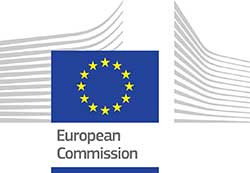

|
|
Oral Chemotherapy Drugs Meeting October 2017, Ljubljana, Slovenia |
|
|
In 24th October 2017, Oral Chemotherapy Drugs Meeting was held in Institute of Oncology Ljubljana, Slovenia in collaboration with Slovene Chamber of Pharmacy. The number of participants was 100. This educational event was a part of the ongoing EPIC project (Empowering pharmacist to improve health-care for oral chemotherapy patients: Establishment of a European best-practice model). There are number of new anticancer drugs on the market, many of them in an oral form. Increasing number of oral anticancer drugs demands a continuous education of pharmacists. Patients are managed ambulatory as outpatients, taking their oral medication at home. Oral therapy is mainly dispensed in community pharmacies and the pharmacists need to counsel patients on the medication use, drug interactions, management of adverse drug reactions to improve patient adherence and to minimize medication errors. Lectures will be given to cover all this topics with case reports. According to the development of the EPIC project, database of oral anticancer drugs as pharmacist's tool at dispensing and counselling to the patients will also be presented |
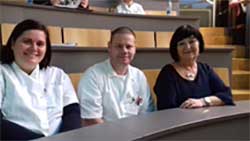
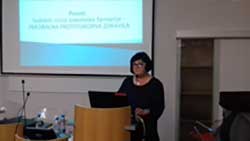
|
|
One day event included ten lectures covering all perspectives of cancer management. The meeting started with opening lecture that covered general principles of oncology/haematology, including etiology, epidemiology, cancerogenesis and treatment of cancer. Other lectures related to oncology included topics such as pharmacotherapy of cancer, presentation of most common adverse drug events of oral chemotherapy drugs and their management, presentation of drug-drug and drug-food interactions with oral anticancer drugs. The meeting was concluded with presentation of EPIC database, safe handling of oral chemotherapy drugs and counselling to cancer patients. The meeting was well accepted among the participants. |
|
BOPA Meeting The 20th BOPA Conference was a celebratory affair. Celebrating past achievements, celebrating the present - world record holders... - and celebrating the future. This was exemplified by the "Challenges for Cancer Research" session. Professor Peter Johnson described the huge increase in patients accessing clinical trials over the last decade (2001 to 2010) (Download the article » ), but that, as with cancer treatment costs in general, the increased cost for the benefit gained is becoming a poorer ratio. Embracing our current increased knowledge of tumour biology, in particular cancer heterogeneity, has led to the establishment of the Cancer Research UK Stratified Medicine Programme. Identification and validation of tumour biomarkers, as well as mutation burden within the tumour allowing identification of the best cancer medicine combinations for groups of patients. One example of this can be found in the MATRIX lung cancer trial, a so-called umbrella protocol. (https://www.birmingham.ac.uk/research/activity/mds/trials/crctu/trials/lung-matrix/index.aspx ). The future still has many challenges if we are to make the most of these developments; improving the sample quality, supporting infrastructure, data analysis, volume and storage, as well as access to patients. |
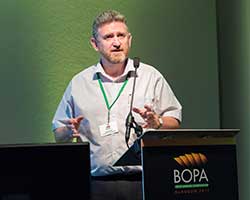

|
|
These developments were echoed in radiotherapy. Dr Stephen Harrow explained how improvements to targeting of radiotherapy; more accurate planning, treatment volumes and tissue sparing techniques, has led to reduced toxicity and reduced treatment times (reduced from around 1 hour to just 4 minutes!). He also explained that further improvements to radiotherapy will come from software development, allowing greater efficiency in the planning of radiotherapy, and increasing the number of treatment options (up to 20 with only minor differences!). This will be achieved in just a fraction of the current time. BOPA were delighted to welcome both Dr Susannah Koontz (HOPA president) and Klaus Meier (President of ESOP) to the meeting to discuss collaboration opportunities. Both speakers were passionate about not only the opportunities to collaborate, but also the importance of collaboration. At a time when global changes move towards isolation it was refreshing to hear how collaboration in oncology pharmacy was not just alive and kicking, but of increasing importance. Improving patients' outcomes through improved adherence and better understanding of their medicines, as well as being a united voice on the continuing problems of cancer medicine shortages - a global problem. Improving the education of the oncology pharmacy workforce was another shared aim. Here's hoping that before the next 20 year period such collaboration is imbedded in all our oncology pharmacy societies.
As part of the BOPA 20 year anniversary celebrations a World record attempt took place with the money raised going to Cancer Research UK and Macmillan. I'm pleased to report that the attempt was (eventually) successful. In a truly international and collaborative attempt both Klaus and Susannah were in the record achieving team and proudly took their medals back home - it will be difficult to beat this first of many successful collaborations! |
|
|
Consensus Information on Biosimilars in 23 Languages |
|
|
Today, the European Commission published translations of comprehensive information for patients on biosimilar medicines. It contains questions and answers on biosimilar medicines and is now available in 23 languages, serving as a reliable source of information for patients. The information guide for healthcare professionals prepared jointly by the Commission and the European Medicines Agency is expected to be available in 6 additional languages in the first half of 2018. The guide is an aid for EU healthcare professionals. It gives reference information on the science and regulation supporting the use of biosimilars in the EU. |
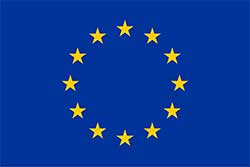
|
|
Together these documents provide comprehensive set information on biosimilars in 23 official EU languages.
Stakeholder events Information on the 2017 workshop is also available including on the dedicated page. It includes following documents:
Background More information Documents
Contact |
|
|
Anti-Cancer Center Pierre and Marie Curie of Algiers Congress |
|
The main pharmacy of the anti-cancer center Pierre and Marie Curie of Algiers organized under the impulse of Pr.Dalila Smati head of the pharmacy in this center and with a very dynamic organizing committee led by Dr. R�da Kessal from 25 to 27 October 2017 with he participation of many national and international experts. This appointment take place every two years and it has been the opportunity to meet all the specialties of the center involved in the fighting against cancer. It was held in the beautiful city of the Sahara Timimoune. This congress brought together 150 participants among oncologists, surgeons, radiologists, pathologists, hospital pharmacists and paramedicals; 34 partner laboratories contributed to this event and 19 were present at the congress. The CPMC wanted to contribute to the campaign "Pink October" by devoting an entire the Session about breast cancer this session allowed to review all the steps from screening and Diagnosis also surgery and finally chemotherapy and the pharmaceutical intervention with Dr. R�da Kessal's presentation on the unknown interactions between breast cancer chemotherapy and nutrients. A presentation on the proposal of a risk management plan specific to the CPMC of the Biosimilars, Trastuzumab Inj., was presented by Pr.Kamel Bouzid Head of the Oncology Department in CPMC; And a national leader in oncology. Pr. Bosnak President of the Turkish Society of Oncology Pharmacy/Vice President of ESOP and therefore also contributed to the Success of these days with presentation on a field little exploited in Algeria, named "Nutrition Support Pharmacy for Cancer Patients". Dr. Yann Gonzalez Phytotherapist in Lyon-France presented the latest scientific news in herbal medicine and oncology: "Contributions and Limitations of the Combination Chemotherapy / Herbal Medicine. Other topics specific to the establishment were discussed named "Hospital Hygiene and the Fight Against Nosocomial Infections", these days wanted the role essential oils in Oncology pharmacy, practitioners and nurses who intervene as closely as possible in supportive care of cancer patients. During these days, Dedication session was organized by the Head of medical oncology of our Hospital Pr.Bouzid Kamel with the collaboration of the pharmaceutical company CIPLA. He signed the preface to a treatise of cancerology written by the team of his department under the leadership of Pr.Gamaz Malika. |
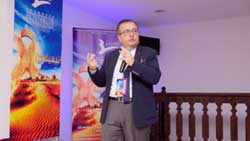
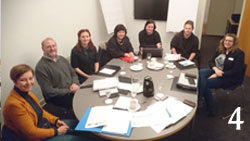
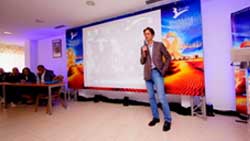
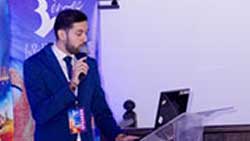
|
|
Two workshops were organized; "Oncology Pharmacy Practice on 10 Steps" led by Pr. Bosnak and Moderated by Dr. M. N. Borsali and Dr. Y Mezaour. The second workshop led by Dr. Gonzalez and moderated by Pr Smati focused on the "Use of Essential oils in Hospitals: Practical Aspects". Finally, the presentation of a young pharmacist Dr. Insaf Benamara was rewarded because she has focused on the "Involvement of the Pharmacist in the Choice of the Therapeutic Strategy and the Management of Metastatic Breast Cancer RH + HER2-" |
|
 |
European Society of Oncology Pharmacy |
|
| If you don't want to recieve any further ESOP Newsletters, please click to unsubscribe. |